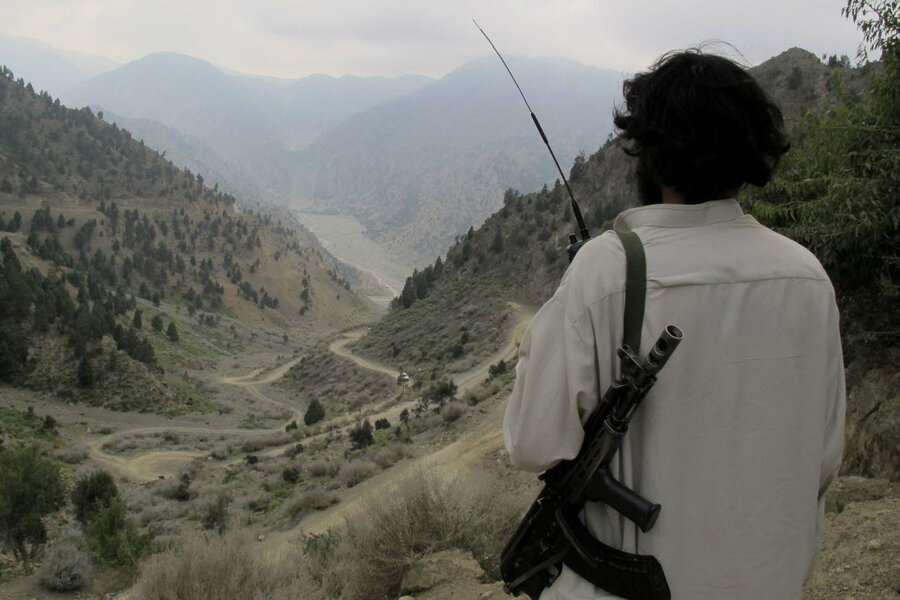With an eye toward peace, Pakistan releases 7 Afghan Taliban insurgents
Loading...
Pakistan freed a group of Afghan Taliban on Saturday in an attempt to improve its troubled relations with the South Asian neighbor, but risked angering Afghanistan by not handing them over directly to the Kabul authorities.
The announcement followed last month's trip by Afghan President Hamid Karzai to Pakistan, where he sought the handover of some Afghan insurgents as part of the stalled peace process.
Both Karzai and the United States want Pakistan to hand the insurgents directly to the Afghan authorities, but on Saturday, a group of seven Taliban was simply allowed to walk out of their cells into Pakistan.
"In order to further facilitate the Afghan reconciliation process, Pakistan is releasing seven Taliban detainees," the Pakistani foreign ministry said in a statement.
A ministry spokesman separately said all seven, including a senior commander called Mansoor Dadullah, were freed on Saturday.
Asked if they had been handed over to the Afghan authorities or were just released in Pakistan, the spokesman said: "Just released."
The releases received a lukewarm reception in Afghanistan, with the government describing it as a "small step" and calling for the release of more senior Taliban members.
Pakistan is key to the fate of U.S. and Afghan efforts to bring stability to Afghanistan, a challenge gaining urgency as the end of the U.S. combat mission in 2014 draws closer.
But mutual suspicions between Afghanistan and its nuclear-armed neighbour have hampered efforts to tackle militancy in one of the world's most explosive regions.
Besides Dadullah, the foreign ministry statement identified the released fighters as Said Wali, Abdul Manan, Karim Agha, Sher Afzal, Gul Muhammad and Muhammad Zai.
"These releases are in addition to twenty-six Taliban detainees released during the last year," it said.
ONE-LEGGED COMMANDER
Dadullah is the younger brother of the one-legged Taliban commander Mullah Dadullah, who was known for his brutal methods and killing of civilians. He was killed himself in 2007.
The Taliban's operational commander in southern Afghanistan, Dadullah was behind a campaign of suicide bombings, kidnappings of foreigners and Afghans, and beheadings of hostages. After his death Mansoor took control of his group.
A Karzai spokeswoman, Adela Roz, declined to comment on the latest release. The U.S. embassy in Kabul, which has played a mediation role regarding the prisoners, also declined comment.
Mohammad Ismail Qasimyar, adviser on foreign relations on the Afghan High Peace Council, appointed by Karzai to promote reconciliation, said Kabul had given Pakistan a list of Taliban detainees it wanted released as part of the president's visit.
He declined to say whether the seven released Taliban were on that list.
An Afghan foreign ministry official, speaking on condition of anonymity, welcomed the releases but called them only a small step towards peace.
"We expect additional and more significant steps by Pakistan in the future, steps that Pakistani leaders can easily take if they so decide, including the release of Mullah Baradar and other senior Taliban leaders currently in Pakistani jails," the official said.
Until being captured in Pakistan in 2010, Mullah Abdul Ghani Baradar was the Taliban's senior military commander and a close friend of the group's reclusive leader, Mullah Mohammad Omar.
Karzai believes Baradar can be used to help tempt elements of the Taliban to the negotiating table and has spent years calling for his release.
Afghanistan has long been pressing Pakistan to hand over Taliban members who can help promote peace negotiations and transform the Taliban insurgency into a political movement.
But there are fears that the end of the U.S. combat mission in Afghanistan would only galvanise the insurgency straddling the porous Afghan-Pakistan frontier, where many Taliban and al Qaeda linked groups are entrenched.
Pakistan backed the Taliban's rise to power in Afghanistan in the mid-1990s and is now seen as a crucial gatekeeper in attempts by the U.S. and Afghan governments to contact insurgent leaders who have fled toPakistan.
One crucial Taliban member still in detention in Pakistan is Mullah Abdul Ghani Baradar, the group's former second-in-command. Pakistani officials have said they will consider freeing him.
Afghanistan, however, believes Pakistan is playing a double game, making public pronouncements about peace while allowing militants to take refuge in safe havens on its soil.
Pakistan denies the charge, saying it has sacrificed more than any other country in the fight against militancy. It acknowledges that it has contacts with the Taliban but says it has no influence over them.







